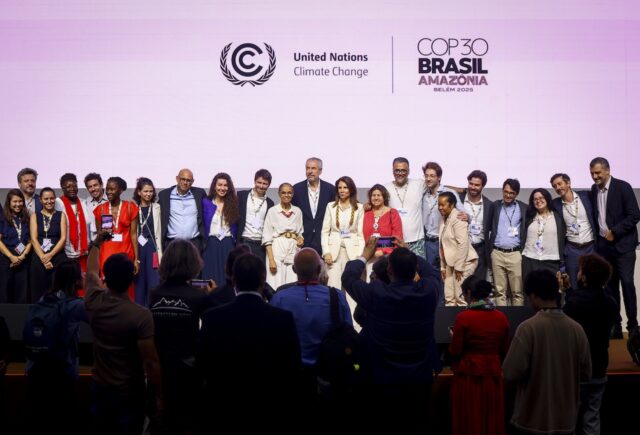With around 600 million Africans without access to the electricity grid, the market for off-grid home solar systems is expected to grow very fast. Yet, local financial institutions are still reluctant to finance the suppliers of these and other solar products. The Green 4 Access First Loss Facility, a new blended finance scheme, is trying to change this.

In short
- Mobilising local capital needed to help finance the fast-growing off-grid energy sector in Africa
- Green 4 Access will offer support for local financial institutions to back energy access schemes
- A first-loss guarantee has to stimulate more lending to off-grid solar energy providers
Many off-grid solar businesses in Africa are international companies financed by impact investors outside Africa, which leaves them exposed to currency risks.
Local currency financing for local off-grid renewables projects and businesses in Africa is still limited, according to a report published by the African Development Bank at the end of last year.
While local financial institutions are increasingly showing interest in energy access, they are still hesitant to lend to the sector because of the perceived high risks. When they offer a loan, the interest rates are so high they are unaffordable for energy companies.
Long-term funding is critical if local capacity is to eventually improve. “When you look at the funding flowing into this sector, it is really very small compared to the required funding,” says Sunkanmi Olowo.
Need for local currency funding
Olowo is the Nigeria-based director of Green 4 Access, which is a collaboration between GreenMax Capital Group, a US consultancy firm advising on international clean energy investment, and Energy 4 Impact, a London-based non-profit organisation working with local businesses to extend access to energy in Africa.
“Most of the funding before now has gone substantially to international companies,” Olowo says. “There’s an urgent need for local currency financing for African-owned companies,” says Koye Alaba, an associate at GreenMax Capital Advisors.
“One reason why there is a need to crowd in local banks into the space is because of the foreign exchange rate risk,” Alaba says. He points out that Sub-Saharan African countries have volatile currencies.
That presents challenges for the likes of pay-as-you-go (PAYGo) companies, where end-users are allowed to pay for solar energy in instalments. “PAYGo providers have to use foreign currency loans or debt, which makes it more problematic.”
Risk mitigation
Mobilising local capital can help to finance the fast-growing energy sector. One way to do so is to offer support to local financial institutions and investors that mitigate the risks.
The thinking is that if local financial institutions are supported, fund flows to the local developers will be greatly improved because they can lend at more affordable rates. Local financing resolves the exchange rate exposure for local PAYGo companies.
There are various initiatives that offer so-called credit enhancement products that are aiming to reduce the financial risks for financiers.
The Africa Guarantee Fund, designed and funded by the AfDB in partnership with the governments of Denmark and Spain, is one example. It provides financial guarantees to financial institutions to stimulate financing to SMEs and unlock their potential to deliver inclusive growth in the region.
Other well-known guarantors include GuarantCo, Proparco, the French development finance institution, USAID and the International Finance Corporation, the private sector arm of the World Bank Group.
First-loss support
The Green 4 Access First Loss Facility partnership (G4A) focuses entirely on stimulating local finance for local off-grid energy providers.
It is a collaboration between GreenMax Capital Group, a US consultancy firm advising on international clean energy investment, and Energy 4 Impact, a London-based non-profit organisation working with local businesses to extend access to energy in Africa.
G4A aims to develop a fund to accelerate investment in African-owned small to medium renewable energy businesses by providing both local and international banks and investors the ‘cushion’ to take a pre-agreed first loss before the investors see losses in case a company cannot meet its debt payments.
“Our research into off-grid electricity led us to the conclusion there’s a need for a first-loss type of guarantee, in order to stimulate local banks to lend more to the off-grid sector,” says Alaba.
According to their comprehensive survey released in September 2020, ‘Local Financial Institutions: A Major Untapped Source of Financing for Energy Access in Africa’, some 68% of surveyed locally-owned off-grid companies identified high collateral requirements – the assets demanded by a lender as security for a loan – as a key barrier for attracting local financing.
“Issues such as credit default and under capitalisation of the financial institution are also important. Some of them are actually lending from their balance sheet and they don’t have the capital to do so,” says Olowo. He signals that African banks face rising levels of non-performing loans.
New blended finance mechanism
GreenMax Capital Advisors is currently fundraising for the facility that is aimed to have a total capitalisation of $50mn. It expects its interim first close by July this year, with a full close planned for the first quarter of next year.
The next step is to create a fund that blends philanthropic and donor money with capital from impact investors, development finance institutions and others.






